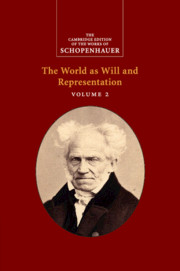Chapter 38 - On History
Published online by Cambridge University Press: 30 June 2022
Summary
In the passage from the First Volume mentioned below, I have shown in detail that literature is superior to history when it comes to an understanding of human nature and why this is so: to this extent we can expect to learn more from the former than from the latter. Aristotle had this insight too when he said: ‘and poetry is more philosophical and valuable than history’. (Poetics, ch. 9.) So as not to occasion any misunderstandings about the value of history, I will now give my thoughts on the matter.
In every kind and species of things, the facts are countless, the individuals infinite, and the multiplicity of their differences inexhaustible. One glance at this will cause a curious mind to reel: it sees itself condemned to ignorance, however far it investigates. – But then in comes science: it separates the countless multitude, collects it under kind concepts, and these in turn under species concepts, opening a path to cognition of the universal and the particular which also includes the countless individuals, since it is true of everything without having to consider each thing on its own. In this way, it offers solace to the mind engaged in research. Then all the sciences line up alongside each other and above the real world of particular things that they have divided among themselves. Philosophy soars above them all as the most universal and therefore most important knowledge, promising information for which the others have merely prepared the way. – Only history is not permitted to enter into this sequence since it cannot boast the same advantage as the others: it lacks the basic character of science, the subordination of what is known, instead merely coordinating the known. Thus there is no system of history, as there is with every other science. It is accordingly a field of knowledge, but not for that matter a science. It never achieves cognition of the particular by means of the universal but must grasp the particular immediately and thus, as it were, creep forward on the field of experience. Meanwhile, real sciences soar above it, since they have won for themselves comprehensive concepts which they can use to master the particular and hence understand the possibility of things within their purview, at least within certain limits, so that they can also be confident about what is yet to come.
- Type
- Chapter
- Information
- Schopenhauer: The World as Will and Representation , pp. 456 - 463Publisher: Cambridge University PressPrint publication year: 2018



